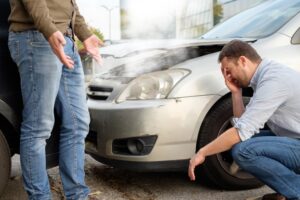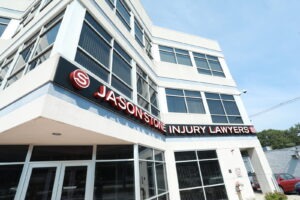
As rideshare services become increasingly popular in Boston, so do the potential risks of accidents involving these vehicles. If you’ve been injured in a rideshare accident, navigating the legal complexities can be daunting, but you don’t have to face it alone. Our team of experienced Boston car accident lawyers specializes in handling cases involving rideshare accidents and is dedicated to helping you seek the compensation you deserve. From determining liability between the rideshare driver, the company, and other parties involved, to negotiating with insurance providers, our Boston personal injury lawyers will provide the expert guidance and advocacy you need. Whether you were a passenger, pedestrian, or another motorist involved in the accident, don’t hesitate to reach out to us for a consultation. We’re here to protect your rights and fight for the justice and compensation you rightfully deserve.
How Can a Rideshare Accident Lawyer Help You?
Rideshare accident attorneys practice personal injury law, helping victims with bodily harm and property damages caused by the negligent or wrongful acts of another. They bring experience to legally intricate situations to ensure you have the representation needed to protect your rights and fight for fast and fair compensation for your losses. The assistance they offer can be indispensable for individuals with severe injuries and substantial losses. Some specific tasks they perform include:
- Evaluating the case to determine the strength of claims and identify the liable parties
- Gathering the evidence needed to prove negligence and damages, such as accident reports, witness statements and medical records
- Negotiating with insurance companies to secure a fair settlement that adequately covers medical expenses and other damages
- Filing a lawsuit against the at-fault party or parties when the insurance company fails to offer a fair settlement
- Preparing for and representing you in court, presenting the case to a judge or jury to secure the most appropriate award
The relationship between a rideshare accident lawyer and their client is both personal and professional. They undertake all the stressful parts of the legal process so you and your family can focus on healing after a devastating accident. They also offer compassionate understanding and sometimes emotional support.
How Does Liability in Ridesharing Accidents Work?
Liability is often more complex in auto accident cases involving rideshare vehicles. There are more parties to consider to ensure you file your claim with the correct insurance provider without wasting valuable time.
Potentially Liable Parties
If you must file a fault-based claim to recover compensation, understanding who is at fault is necessary. In ridesharing accidents, the potentially liable parties include:
- The rideshare driver. The person operating a vehicle while using a rideshare accident is liable if their negligence or reckless behavior contributed to the accident.
- The rideshare company. Companies like Uber or Lyft may bear some responsibility if they fail to conduct property background checks or if their app has significant distractions.
- Other drivers. If another driver hit your vehicle while you used a rideshare app or were a rideshare passenger, the other motorist would be liable for damages.
- Vehicle manufacturer. If an electrical or mechanical defect in the vehicle causes the car to malfunction and wreck, the manufacturer could be liable for damages.
Suppose the rideshare driver is responsible for an accident leading to a fault-based claim. In that case, their level of engagement with the app will determine whose insurance is liable for the damages. For example, Uber and Lyft provide similar liability coverage once a driver accepts a ride offer. The amount increases when the driver has a passenger in transit. If you have questions regarding where to file your fault-based claim, a rideshare accident lawyer can help you start and finish the process.
Proving Negligence
When you file a fault-based case, you are responsible for proving your negligence claims against another party. During their investigation, your attorney will gather the evidence needed to establish the four necessary components of a negligence claim:
- The other party’s duty of care. Every vehicle operator on the road is responsible for using reasonable driving practices to keep others safe.
- The other party’s breached duty. Violating a traffic law indicates that the at-fault driver violated their duty.
- Direct causation. You must show that the other party’s actions directly caused your accident.
- Resulting damages. You will also need to connect your accident and injuries undeniably.
Police reports, eyewitness testimony and medical records are typical examples of evidence used to prove liability. An experienced attorney knows where to look for sufficient evidence to meet the burden of proof in a civil case.
What Massachusetts Laws Govern Rideshare Accident Cases?
The four laws most relevant to ridesharing accidents in Massachusetts include the process for reporting a car accident, the statute of limitations, the no-fault insurance requirement and the comparative negligence rule. If you suffered injuries and property damages in an accident involving a rideshare vehicle, understanding these laws is essential to the legal process.
Reporting a Car Accident
If anyone suffered an injury or lost their life in an auto accident, the law mandates a complete accident report within five days of the collision. The same is true if there was any vehicle damage valued at more than $1,000. You can complete the Motor Vehicle Crash Operator Report form and send it to the police department or call the police at the scene. The report can be critical evidence for your insurance claim or lawsuit if you suffered severe injuries or property damage.
The Statute of Limitations
A statute of limitations refers to the timeframe in which you can file a lawsuit against the at-fault party. In Massachusetts, you have three years from the date of the accident to file, but insurance companies often have internal deadlines that are much sooner. Waiting too long can compromise your claim.
If you lost a loved one in a ridesharing accident, their estate executor also has three years to file a wrongful death lawsuit. However, the clock starts ticking on the date of your loved one’s death rather than the day the collision occurred. If you missed the deadline, speak with a rideshare accident lawyer to see if you have other options.
The No-Fault Insurance Requirement
Massachusetts, along with a handful of other states, requires vehicle operators to carry personal injury protection insurance along with the state-mandated minimum coverage requirements. The purpose is to ensure that anyone injured in a car accident has sufficient coverage for the following:
- Medical expenses stemming from the injuries
- Up to 75% of your lost income during recovery
- Any replacement services, such as assistance with household tasks, needed during recovery
If your injuries from the accident are severe, you may need to file a fault-based claim. PIP coverage caps at $8,000, which is often insufficient to cover the damages resulting from a severe accident. In this situation, you can either file an insurance claim against the at-fault driver and draw from their liability coverage or take legal action in civil court. This opens the door for a more comprehensive range of compensation, covering all the recoverable damages from your case.
The Comparative Negligence Rule
When you file a fault-based claim against another driver, a typical response includes allegations of shared fault. If you are partially liable for damages, you may still be able to recover a portion of available damages. Massachusetts applies the modified version of the comparative negligence rule to cases with shared fault. Under this rule, you are eligible for compensation as long as you are not more than 50% responsible for the accident.
In practice, the court will determine a final value for your economic and non-economic losses. It then assigns a percentage of fault to both parties involved in the crash. For example, if your losses amount to $50,000 and the court fines you 50% at fault, you can still recover $25,000. However, if the court finds you 51% liable or more, you will not be eligible for damages. If you have questions about your ability to receive compensation, an experienced rideshare accident lawyer will listen to your case and help you understand your legal options.
What Is the Process of Filing a Personal Injury Lawsuit?
The process for filing a personal injury lawsuit includes several stages, from the start to the final award determination. The first stage is to consult with an attorney to ensure you take all the appropriate steps to develop a solid claim. Once they help you draft a robust demands package to present to the court, they will notify the defendant. This entails sending a letter of intent to the individual or organization responsible for the injury to inform them that you intend to file a lawsuit. The stages that follow include:
- Filing your official complaint. Present your demands package to the court with all the evidence collected during your attorney’s investigation into the accident and its aftermath.
- Await the defendant’s response. The defendant has 20 days to respond to the complaint with an answer, a counterclaim or a motion to dismiss.
- Engage in discovery. You will exchange evidence and information with the defendant, including depositions, interrogatories and document requests.
- Negotiations. Using the evidence provided in your demands and received during discovery, your attorney will begin negotiating a settlement on your behalf.
- Explore other options to resolve the case. You can try mediation or arbitration to reach an agreement without trial.
Nearly all auto accident cases end in settlements without seeing the inside of a courtroom. Most insurance providers prefer to avoid the costly and sometimes lengthy trial process. Instead, they will settle, and the stronger your evidence is, the more likely you are to receive a fast and fair settlement. Should your rideshare accident lawyer take your claim to court, settlement negotiations can continue throughout the trial. The actual value of your fault-based claim will depend on the damages available from your case.
Damages You Could Recover
Damages refer to the recoverable losses associated with your accident. These can include economic and non-economic damages from the accident. Economic damages reflect the financial losses incurred, and non-economic damages cover the psychological impact of your case. For example, a comprehensive demand for damages from a fault-based claim for a rideshare accident may include:
- The total cost of all medically necessary treatments, including any ongoing care you receive
- The lost income from missing work or losing the capacity to do the job you did before
- The cost of repairing your vehicle or any other damaged property
- The physical pain and suffering you endured because of your injuries and treatment
- The emotional distress and mental anguish associated with your accident, including post-traumatic stress, anxiety, depression and loss of the ability to enjoy life
Unlike a no-fault insurance claim, you can recover all available damages, including the total lost income, through a fault-based claim. PIP insurance does not account for the emotional impact of severe injuries. This is why consulting with an experienced rideshare accident lawyer can increase your chances of receiving adequate compensation for your losses.
What Can You Do in the Aftermath To Protect Your Claim?
In the immediate aftermath of a rideshare accident, there are a few steps you can take to protect your claim and ensure you receive proper medical care:
- Report the accident to the police so they can investigate and file a formal accident report.
- Document the accident scene with photographs or videos, including visible injuries and property damage.
- Seek a medical evaluation immediately to document your injuries and their causes in official medical records.
- Avoid speaking to anyone other than your attorney about the case, including posting on social media.
- Contact an experienced attorney before speaking to the insurance company.
Insurers often resort to unsavory tactics to minimize their financial responsibility following an accident. They are significantly less likely to respond combatively when dealing with a legal professional. Having that buffer between you and the adjuster assigned to your case can relieve the stress often related to auto accident claims.
Should You Contact a Rideshare Accident Lawyer?
The aftermath of a rideshare accident can be confusing and frustrating. If you have questions about your case and how you can access adequate compensation, an experienced rideshare accident lawyer at Jason Stone Injury Lawyers can help. We understand the financial devastation these cases can cause. That is why the first element of the Stone Cold Guarantee states that we only get paid if you get paid. Contact Jason Stone Injury Lawyers to schedule your free consultation today. There’s No Obligation, Just Information. (R)
Not Trusting What You’re Being Told?
Better Phone Stone
(800) 577-5188
 START MY NO OBLIGATION CONSULTATION
START MY NO OBLIGATION CONSULTATION











